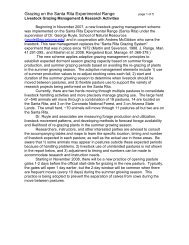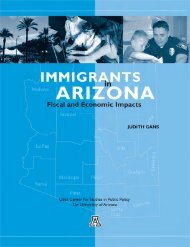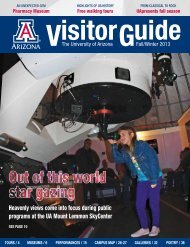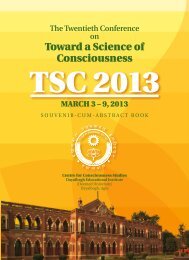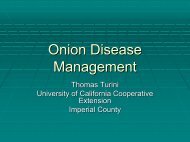CONSCIOUSNESS
Download - Center for Consciousness Studies - University of Arizona
Download - Center for Consciousness Studies - University of Arizona
- No tags were found...
Create successful ePaper yourself
Turn your PDF publications into a flip-book with our unique Google optimized e-Paper software.
196 5. Experiential Approaches<br />
294 Exploring Higher States of Consciousness in Sport - Sport as a vehicle to<br />
understand the potential of human consciousness Damian Vaughn,<br />
(The Vaughn Center, Phoenix, ARIZONA)<br />
The essence of my talk is grounded in the research that I have done for my upcoming<br />
book and my coaching practice working with high-performance athletes. I will talk on the<br />
concept of ‘Flow’ coined by Dr. Mihaly Csikszentmihalyi, and discuss the different levels of<br />
‘flow’ or ‘the zone’ that I propose of being available to us. Firstly, We will create a definition<br />
of the zone (flow, peak experience) in sports based on the surveys I carried out with over 200<br />
professional athletes in various sports (MLB, NFL, NHL, NBA, PGA, Olympic, etc.). We<br />
will create a definition of the zone based on its attributes. These attributes will be based on<br />
the subjective experiences of the athletes surveyed, including my personal experience as a<br />
professional football player. Secondly, I will discuss the barriers, obstacles, and inhibitors of<br />
the zone experience in sport and life. All of these barriers are effects or manifestations of one<br />
fundamental cause - the Ego. We will define the ego as the level of mind that is incessantly<br />
concerned with survival, positioning, comparison, and categorization. A2<br />
5.5 Transpersonal and humanistic psychology<br />
295 Ground-Breaking Qualitative Research Method: Intuitive Inquiry Embedded<br />
With Grounded Theory Laurel McCormick <br />
(Institute of Transpersonal Psychology, Charlotte, NC)<br />
An innovative research method was used in a dissertation study of the experience of noself<br />
in advanced stages of spiritual development. In this examination of the phenomenon of<br />
no-self as lived experience, the intuitive inquiry research method was ideal for exploring<br />
and analyzing semi-structured interviews of participants voicing their complex, detailed oral<br />
histories related to no-self. Intuitive inquiry was the overarching method that guided this exploratory,<br />
qualitative research; however, the investigation into no-self potentiated generating<br />
empirically based theory or of confirming current theories. Therefore, constructivist grounded<br />
theory was incorporated into intuitive inquiry as a pragmatic foundation for coding, categorizing,<br />
and analyzing participant data, with the goal of providing a framework for new theory.<br />
Including grounded theory in the intuitive inquiry method required an innovative course of<br />
action for analyzing data and synthesizing results. The intuitive inquiry method structured the<br />
research project through 5 iterative, hermeneutical cycles processed by means of intuition and<br />
interpretation. Successive rounds of grounded theory data analysis were integrated into intuitive<br />
inquiry cycles. Combining the intuitive inquiry method with grounded theory verified<br />
intuitive inquiry information, conclusions, and procedures in a pragmatic, analytical research<br />
process toward theoretical results. Both methods functioned toward guiding emerging data<br />
analysis and theory development by cross-checking and making apparent the intuitive and<br />
analytical cognitive processes of the researcher. The intuitive inquiry and grounded theory<br />
exploratory study of no-self as lived experience produced a theory of no-self as a continuum<br />
toward enlightenment; future research may substantiate research results. Due to attention to<br />
detail afforded by combining intuitive inquiry and grounded theory, this study may further<br />
understanding of self, dissolution of ego, and transformation and integration of experiences of<br />
no-self toward higher stages of consciousness. P5<br />
296 Transformations of Bereavement in a Psychomanteum Process: Qualities of<br />
Meaning and Paths of Change Rebecca Merz (William<br />
James Center, Institute of Transpersonal Psychology, Palo Alto, California, Manchester, MT)<br />
This doctoral dissertation research reports qualities of participant experiences in a psychomanteum<br />
process used to ease grief components. The psychomanteum process is a mirrorgazing<br />
procedure that induces a mild altered state of consciousness in the participant who<br />
desires to contact a deceased loved one to facilitate bereavement. The psychomanteum is a<br />
quiet, dimly lit room or booth with a mirror at one end used to focus attention. The participant<br />
sits in a chair and softly gazes at the mirror, which is tilted to reflect the surrounding darkness.<br />
In the present study, the participant was led by a trained psychomanteum facilitator through



